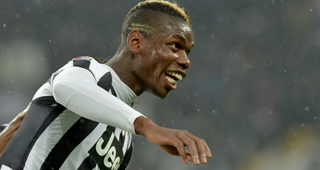You’ll excuse the tense-hedging here: Paul Pogba has signed for Manchester United, or he will sign imminently, or he signed a few days ago and we’re just hearing about it now, in a near-official capacity that will become mega-official when Juventus or United put out a press release or Pogba channels a public relations flak with a tweet thanking Juve fans for “all the love you’ve given me.”
These big money transfers rarely transpire quickly or cleanly. They are continually happening, stalling, getting back-burnered, then happening again, and they finish like an airplane pilot telling the cabin to ready for final descent, then circling the landing strip for two-and-a-half weeks. They are mostly just noise, but this is the offseason, so noise stands in for the actual sport. And sometimes, for what it’s worth, a move does occur.
The noise around Pogba’s Juve exit has been pitched particularly loud because Pogba is Europe’s hottest property, in both the literal and metaphorical senses of the word. Pogba has been pegged for the past couple of years as the game’s next great global superstar, which is different from being the world’s best young player, though the latter may be true as well.
If you watch Pogba play even just a couple of games, he stands out, even when he doesn’t perform well. He’s powerful and fast and he controls the ball sometimes with a lilliputian winger’s grace and sometimes by knocking it an unexpected direction, then crazy-legging past a defender to get to it. He likes to play long, difficult diagonal passes and he can alternately wallop the ball off the outside of his boot or curl it softly in into the path of an attacker. There is so much about his game that’s devastatingly effective, but he adds to that an obvious desire to thrill and impress. He’s brash and playful and is usually wearing a breathtakingly awful haircut; he speaks openly about competing for Ballon D’Ors. If Paul Pogba were merely as talented as Aaron Ramsey, he would be considerably more famous than Aaron Ramsey, just because of the way he plays and carries himself.
Pogba also has some work left to do. Playing in Serie A, which is the most obscure of Europe’s four major leagues, he lives in the imagination of a lot of fans as his highlight reel, rather than as a fully formed player. He’s not, strictly speaking, a great midfielder in the sense that his influence on matches is sudden rather than sustained. He has immense passing ability, but it leaves him from time-to-time. He loses focus and leaves a simple ball five feet short, or he gets bored and bypasses the simple ball altogether. His defensive positioning could use some fine-tuning, although he’s so quick that he can get away with occupying less-than-ideal spots. Basically, Pogba’s as good as anyone could expect him to be at 23: he has boundless talent and is in the process of assembling it.
Moving to Manchester United will help him do that. Serie A isn’t as snooze-inducingly uncompetitive on a game-to-game basis as its harshest critics posit, but Juve have won the league by a combined 52 points in the four years Pogba has played in Turin. There wasn’t much left for him to accomplish domestically. He could have stayed one more year and tried to win the Champions League—which United are literally incapable of doing this season—but beyond that, he was always going to move to England or Spain, and making the switch at same moment José Mourinho takes over a determined-to-be-resurgent United is smart timing. Pogba needs someone to push him at this point in his career, and Mourinho is a genius and a bastard, which makes him the perfect mentor. Mou will construct United around Pogba’s versatility, giving him both creative freedom and tactical responsibility. He’ll make the most of whatever Pogba gives him.
Pogba, acutely aware of his own brand and its place in the soccer world as he is, probably knows what he’s doing this summer: he’s following the same path as Cristiano Ronaldo and Gareth Bale. Both players were The Next Big Things and made lavishly expensive switches to Real Madrid just as they were entering their respective primes. Ronaldo took off almost immediately. In his second season in Madrid, he scored 56 goals; in his third, he scored 71. Any doubts about him during his Manchester days burned up in the heat of his resplendence. Bale has been a more modest success in all-white. Part of that is due to Ronaldo’s position as the club’s alpha forward, but the reality is Bale is in a lot of ways a lesser, younger Ronaldo, and that sticks out when he’s playing alongside the man himself, for the biggest club in the world. There’s a whiff of disappointment about him, even though he’s exhilarating on his day and carries Madrid more than he gets credit for. That’s the sort of quasi-stigma that unfairly sticks to you when you’re ascending in your early 20s and your development doesn’t continue to rocket upward.
That’s where Paul Pogba is at the moment. He’s Cristiano Ronaldo, he’s Gareth Bale, only a year younger than they were when they decided they were ready to make a career-defining move. Pogba could do anything and everything at Manchester United. He has the confidence and the ability, and that’s precisely what makes his future so perilous and exciting.



